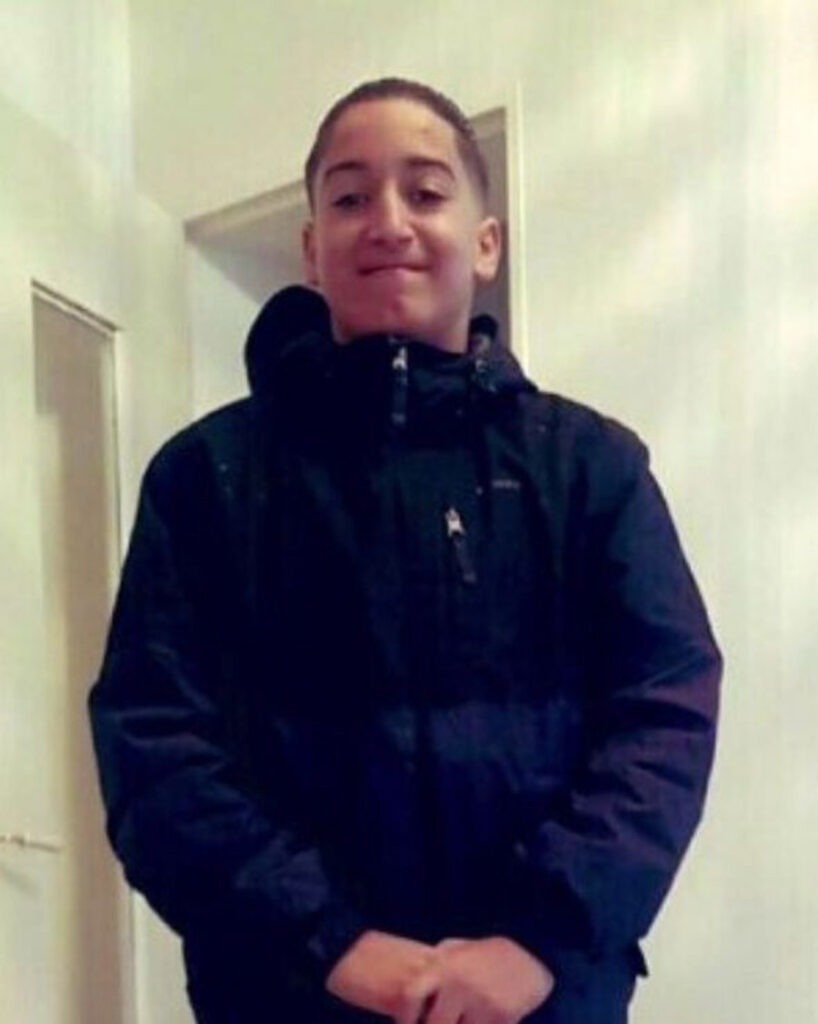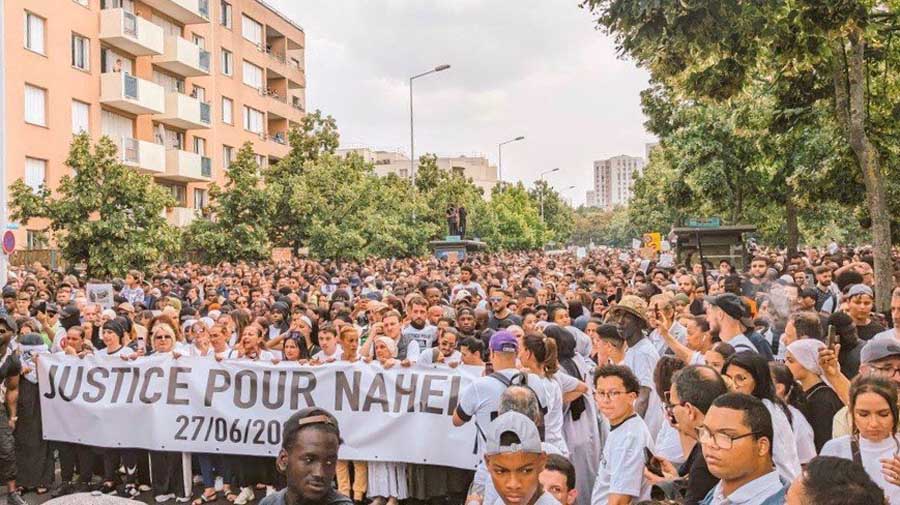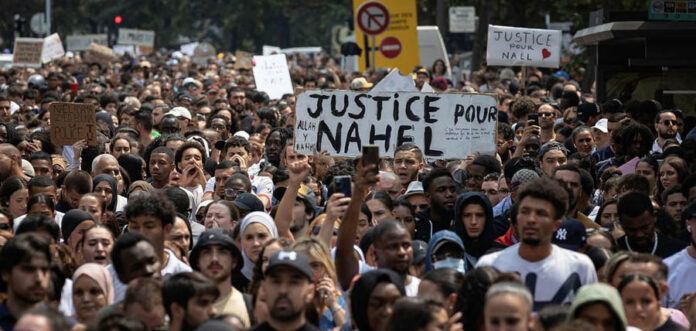Giorgos Ligouriotis
Since Tuesday, June 27, France has witnessed a huge social explosion following the cold-blooded murder of a 17-year-old boy of Algerian origin, named Nael M, by the police in the working-class suburb of Nader in Paris. Angry demonstrations and clashes with the police are taking place every day in dozens of French cities.
Cold-blooded murder
Initially, the police claimed that Nael – who was driving a rental car – repeatedly broke traffic rules. The police officers, who were on a motorcycle, claimed that they tried to stop the car and Nael sped towards them, threatening to run them over, so one of the officers shot the driver in the chest to stop him.
This police narrative was revealed within hours to be an outright lie. The shocking video that has captured the killing of Nael, which has gone viral on social media, shows the two officers pulling over the car Nael was driving. One of the officers points his gun at Nael, who starts the car. The officer then shoots the 17-year-old at point-blank range. The car crashes into a pole and stops a few feet away.
Two other people were in the vehicle, one of whom was arrested immediately after the collision, while the other managed to escape. In fact, the police arrested a member of the ambulance crew who arrived at the scene because he strongly protested against them.

Under the pressure of public outcry, the Nader prosecutor’s office announced the opening of two investigations. One with charges of “refusing a stop signal” and “attempted voluntary manslaughter against public authorities” for the victim and the arrested passenger, and one with charges of “voluntary manslaughter by public authorities” against the police officers.
Clashes and intensified repression
This murder has created an explosive atmosphere. On the same day of the murder, demonstrators gathered in front of the Nader police station, chanting “Justice for Nael” and “Police everywhere, justice nowhere”.
That evening, clashes spread to other areas of the Paris region and other cities across the country. Protesters gathered in the suburbs of Nader, Clichy-chou-Bois, Asnières and Colombes, while they stormed and set fire to municipal buildings in Nader and Mantes-la-Jolie.
For its part, the French government, wanting to avoid an uprising similar to that of 2005, responded with extreme repression, putting 45,000 police officers on the streets on Friday, June 30.
At the same time, French Prime Minister Elisabeth Bourne announced that special police units with armoured vehicles had been mobilised to suppress the protests.
As a result of this brutal crackdown, two protesters were killed: a 19-year-old who fell from the roof of a supermarket while the store was at the centre of riots, and a 50-year-old in French Guiana (where angry protests also took place) who was killed by a stray bullet during clashes.
So far, the number of arrests has exceeded 2,000, with the average age of those arrested being 17.
At the same time, police unions issue provoking statements, warning of “resistance to the government” and calling protesters “parasites”:
“Now that’s enough…
Facing these savage hordes, asking for calm is no longer enough, it must be imposed!
Restoring the republican order and putting the apprehended beyond the capacity to harm should be the only political signals to give.
In the face of such exactions, the police family must stand together.
Our colleagues, like the majority of citizens, can no longer bear the tyranny of these violent minorities.
The time is not for union action, but for combat against these “pests”. Surrendering, capitulating, and pleasing them by laying down arms are not the solutions in light of the gravity of the situation.
All means must be put in place to restore the rule of law as quickly as possible.
Once restored, we already know that we will relive this mess that we have been enduring for decades.
For these reasons, Alliance Police Nationale and UNSA Police will take their responsibilities and warn the government from now on that at the end, we will be in action and without concrete measures for the legal protection of the Police, an appropriate penal response, significant means provided, the police will judge the extent of the consideration given.
Today the police are in combat because we are at war. Tomorrow we will be in resistance and the government will have to become aware of it.”
What they are asking for is more freedom in their methods of repression and more legal protection for their criminal acts.
The announcement comes in response to a statement made by Macron on June 28, which called the shooting of Nael “inexplicable and unforgivable.”

Protest bans and emergency measures
The Macron government has already taken emergency measures in some cities. In Marseille, a ban on rallies has been decided and a stoppage in public transport in the afternoon has been imposed. Similarly, in Paris, buses and trams stop running at 21:00.
Meanwhile, the government is appealing to parents to keep children off the streets, and has called on social media platforms to contribute to the crackdown on protests, asking TikTok and Snapchat to withdraw videos with “sensitive content” and identify users who use “social networks to incite disorder or intensify violence”.
At the same time Macron is under increasing pressure from the right to declare a state of emergency. Both the far-right Marine Le Pen and the president of the right-wing party Les Républicains, Eric Ciotti, are pushing in this direction, essentially calling for more repression.
Resistance to police repression and the Macron government
These events come in the wake of mass demonstrations and strikes by millions of workers against the recent pension reform. They reflect the accumulated anger of youth and those living in the working-class suburbs of the big cities as they face the perennial problem of marginalisation, poverty, unemployment and police violence.
Of course, once again, both the national and international media choose to highlight and exaggerate “broken shops”, “looters” and scenes of clashes with the police, trying to influence the consciousness of society and reduce support for the movement. It is a “classic” method of the system, which, in its attempt to hide its responsibility for social explosions, accuses the demonstrators of trying to impose “chaos”.
But the responsibility of the police in causing the social explosions we are seeing is so great that they can no longer hide it.
It is telling that in 2022 there were 13 deaths recorded during police traffic controls because the victims “refused to comply”. This is the result of a new 2017 law that relaxed the rules on shooting as a means of “lawful self-defense” and allows police officers to shoot even if they are not in immediate danger.
This law, combined with the fact that police officers label those who protest as “parasites” reveals the harsh reality faced by workers, youth and immigrants. The establishment uses its fully armed forces to suppress anyone who opposes and resists.
These are the same police forces that in recent years have acted to back bourgeois governments against mass movements such as the “Yellow Vests” and the recent historic movement against pension reform.
The anger of the youth, the clashes and the spontaneous nature of the mobilisations are the natural consequence of the harsh living conditions and uncontrolled police repression.
Unfortunately, however, anger alone does not bring results. Spontaneous demonstrations, no matter how massive or militant, will eventually run out of steam. The youth movement that is currently developing in France needs to be linked to the working class resistance that developed in recent years – with the common goal of a major social and political upheaval that is needed. But this connection will not happen on its own. It needs the action and intervention of the Left, especially the anti-capitalist Left.













